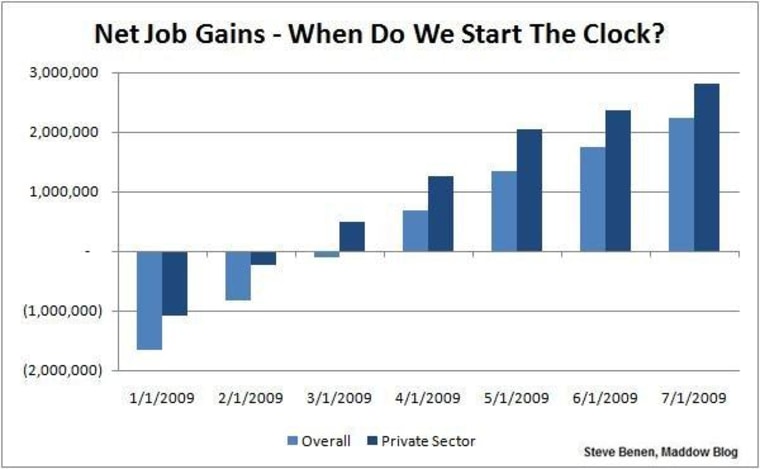By carefully manipulating statistics, Mitt Romney and his campaign are pushing a wildly misleading claim this week about job creation in the Obama era. But there's a larger analytical point that shouldn't get lost in the shuffle: who deserves the blame for the job losses in early 2009?
Greg Sargent noted yesterday that Romney, as part of his new con, "relies on a net overall job loss calculation that uses January 2009 as a starting point." Since President Obama didn't take office until Jan. 20, 2009, and hadn't implemented any economic policies in his first 11 days, blaming Obama for the month's job losses seems ridiculous by any fair standard.
Greg added, "But here's the thing about this. Romney's use of the basic fallacy on display here goes well beyond this one claim about women. It's central to virtually his entire case against Obama's economic record."
Quite right -- when we start the clock makes all the difference. Romney argued two weeks ago, for example, "Since Barack Obama became president, over 800,000 Americans have lost their jobs." The presumptive Republican nominee called it a "basic fact" -- take all the jobs lost, measure against all the jobs gained, and Obama is still hundreds of thousands of jobs in the hole.
Or is he? Consider this new chart I put together.
This may seem a little complicated, and it's no doubt a lost cause in an age of six-second soundbites, but bear with me.
Indeed, consider a thought experiment. Imagine you could go back to March 1, 2009, when the global economy was on the brink of collapse. The White House's Recovery Act had just been signed into law, but the investments had barely even begun, and Obama, still unpacking, did not yet have his full economic team in place.
Then imagine a Republican arguing, just six weeks into Obama's term, "Mr. President, the economy has lost 726,000 jobs on your watch, and we're blaming you for the losses."
Would any serious person find this fair or reasonable? Of course not. And yet, it's the basis for the Romney campaign's entire economic critique of the Obama administration.
The question is, when do we start counting? As of yesterday, the Romney campaign said we should start on Jan. 1, 2009, three weeks before Obama took office. And looking at the chart, we see that the net shift in jobs, starting on that date through today, is -1.6 million jobs (-1 million looking only at the private sector).
But if we start the clock on March 1, 2009, after Obama's first full month in office, the net change for his presidency is -102,000 (or +484,000 looking only at the private sector).
If we say Obama walked into a nightmare and the first six months of 2009 shouldn't count against him, the economy, combining all the jobs lost and all the jobs gained, had added 2.24 million overall (2.8 million looking only at the private sector).
When we start counting makes all the difference. To make Obama look like a "failure," Republicans want the earliest possible point to start the clock.
Of course, given the severity of the global crash Obama inherited, most reasonable people can agree blaming him for the early job losses is unfair, if not ludicrous. But given that this is central to Romney's critique of the Obama presidency, it's important to keep the figures in mind -- the only way Romney's criticisms make any sense at all is if you hold Obama responsible for the conditions he walked into immediately after (or shortly before) his inauguration.
